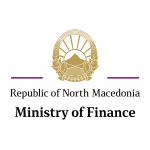2nd June 2021, Skopje – In the medium term, economic growth rates will exceed 5%, unemployment rate will drop to 8.6%, while employment rate will increase to 54.3%, average wage will rise with an average rate of around 4%, gross investments will pick up to 36.2% in 2026, with export surging with an average rate of around 8.8%. These are the projections outlined in 2022-2024 Fiscal Strategy (with prospects until 2026), continuing the good practice which the Ministry of Finance set with the previous revised Fiscal Strategy for longer-term planning over the next 5 instead of 3 years.

According to the baseline medium-term scenario, economic growth in 2021 is projected at 4.1%, with average annual growth of 5.4% projected for the period 2022-2026. Baseline scenario is built on the viewpoint that the economy will recover in 2021, followed by intensification of the economic growth. Government support will continue in 2021 as well through different measures, all to the end of faster recovery of the domestic economy and creating basis for accelerated economic growth in the longer term. With respect to the external environment, gradual stabilization of the global supply chains is expected, as well as increase of the foreign demand, which, coupled with the decreased pressures from the pandemic globally, are expected to have positive effect on the domestic economic developments in the coming period, both the foreign trade and the investments and consumption. Favourable international environment and mass immunization process in the country are expected to have beneficial effect on the expectations and the confidence of the domestic economic entities and the propensity for investments and consumption.
Investments will play a crucial role in the economic recovery and its gradual intensification. Real gross investments growth is projected at 8% in 2021, with investments expected to record an average annual growth of 8.8% in the period 2022-2026. Growth of investments is based on the expected growth of private investments, in conditions of gradual restoring of business entities’ confidence, more intensive inflows of FDIs, expected fiscal stimulus, to be channeled through increased capital expenditures, as well as increased support for private sector development and boosting the competitiveness, support to innovations and technological development of enterprises.
Export of goods and services is expected to grow by 10.6% in real terms in 2021 as a result of exhausting the adverse economic effects of the pandemic, recovery of the global value chains and external demand, as well as improved utilization of the production capacities in the country. In the medium term, in conditions of expected stabilization of the growth of external demand and increased export potential in the country via inflow of FDIs, the export is expected to have a solid contribution to the economic growth, i.e. it is projected to experience average annual growth of 8.8% in real terms in the period 2022-2026.
According to the baseline macroeconomic scenario, number of employees is expected to increase by 1% in 2021, while in the period 2022-2026, employment growth is expected to speed up, i.e. average annual increase of 3.6% is projected. Employment growth in this period is expected to also reflect on the labour supply, projected to increase by 1.7% annually on average. Such trends on the labour market will contribute for the average unemployment rate in 2026 to drop to 8.6% and the average employment rate to surge to 54.3%. Increase of the average net-wage in this period is expected to be 3.8% annually in nominal terms, with prospects for moderate intensification of the increase hand in hand with the productivity.
2022-2026 Fiscal Policy reflects the commitment to further strengthening of public finance management and fiscal sustainability, which is to contribute to maintaining macroeconomic stability and gradual fiscal consolidation. Medium-term priorities will be geared towards coping with the consequences from the COVID-19 pandemic, by scaling up investments through direct support of investment activities of companies, promotion and facilitation of the investment climate and the internationalization of businesses. In the medium-term period, fiscal policy remains to focus on ensuring substantial public investments, being a precondition for improvement of economic perspectives, as well as better life of the citizens.
Total revenues of the Budget of the Republic of North Macedonia (central government and Funds) for the period 2022-2026 are projected to around 31.3% of GDP. In the period 2022-2026, average share of total expenditures of the Budget of the Republic of North Macedonia accounts for around 34.4% of GDP.
Commitments to gradual fiscal consolidation remain to be priority. Budget deficit is projected to gradually narrow to 2.2% in 2026, i.e. 4.3% in 2022, 3.5% in 2023, 2.9% in 2024, 2.5% in 2025 and 2.2% in 2026. Primary budget deficit (budget deficit excluding interest payments) will accordingly decline gradually from 3.0% of GDP in 2022 to 1.2% in 2026.
















